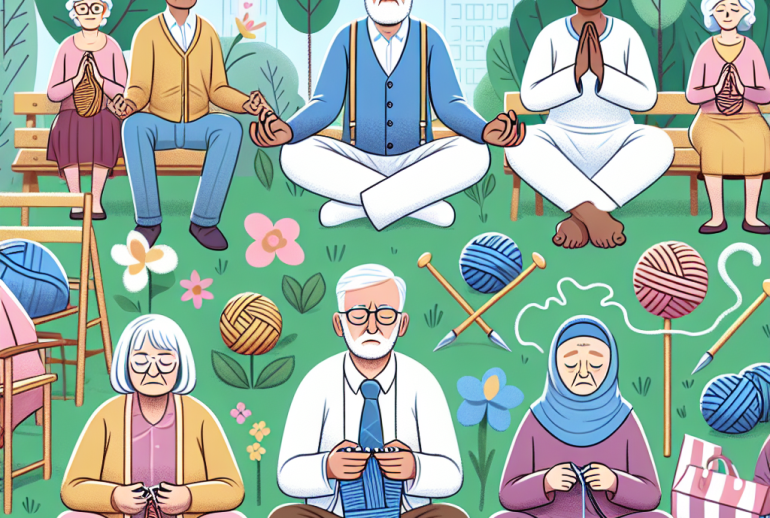As we age, the experiences and challenges we face undergo significant transformations. One such challenge that often goes overlooked is anxiety in older adults. Contrary to popular belief, anxiety does not magically disappear with age. In fact, it can sometimes intensify, brought on by health concerns, loss of loved ones, and other age-related changes. Thankfully, there are ways to cope, manage, and even overcome this anxiety. In this post, we’ll take a detailed look at anxiety in older adults and explore strategies to help manage it effectively.
Understanding Anxiety in Older Adults
Anxiety is a natural response to stress and perceived threats, but it becomes problematic when it interferes with daily activities and quality of life. Studies suggest that anxiety disorders are one of the most common mental health issues in older adults, yet they are often underdiagnosed and undertreated.
Risk factors for anxiety in older adults include chronic medical conditions, physical limitations, financial stress, and social isolation. Furthermore, older adults may experience anxiety related to retirement, changes in living arrangements, or the caregiving role for a spouse or other family member. Recognizing these triggers is the first step towards managing anxiety effectively.
Signs and Symptoms
Identifying anxiety in older adults can be challenging because the symptoms often overlap with other medical conditions. Common physical symptoms include:
- Muscle tension
- Fatigue
- Restlessness
- Headaches
- Stomach issues
- Sleep disturbances
Emotional and psychological symptoms may feature persistent worries, feelings of dread, difficulties in concentration, and irritability. Behavioral changes, such as increased use of coping mechanisms like alcohol or medication, withdrawal from social activities, and changes in eating habits, can also indicate anxiety.
Impact on Well-being
The repercussions of unmanaged anxiety are far-reaching. Beyond diminishing the quality of life, anxiety can exacerbate other health conditions, including heart disease, diabetes, and respiratory disorders. Anxiety also heightens the risk of cognitive decline and has been linked to an increased incidence of depression.
Coping Strategies
Medical Interventions
Consulting with healthcare professionals is paramount. General practitioners, mental health specialists, and geriatricians can offer tailored advice and treatment plans. Cognitive Behavioral Therapy (CBT) is particularly effective in helping older adults reframe negative thought patterns and develop coping mechanisms. Medication, such as antidepressants or anxiety-reducing drugs, can be prescribed, though they should be used cautiously due to potential side effects and interactions with other medications.
Physical Activity
Engaging in regular physical activity is incredibly beneficial for both physical and mental health. Exercise releases endorphins, the body’s natural stress relievers. Activities such as walking, swimming, or tai chi are particularly suitable for older adults as they are low-impact and adaptable to varying levels of fitness.
Social Connections
Isolation is a significant contributor to anxiety and depression. Maintaining social connections, whether through family, friends, or community groups, can provide essential emotional support. Participation in volunteer work, joining clubs, or attending local events are excellent ways to foster social engagement.
Mindfulness and Relaxation Techniques
Practices such as mindfulness, meditation, and deep-breathing exercises can substantially reduce anxiety levels. Guided imagery, progressive muscle relaxation, and yoga are also effective techniques. These practices not only help to calm the mind but also improve focus and emotional regulation.
Healthy Lifestyle Choices
Maintaining a balanced diet, getting adequate sleep, and avoiding excessive alcohol consumption are crucial for managing anxiety. A diet rich in fruits, vegetables, and whole grains can enhance overall well-being, while poor sleep can exacerbate anxiety symptoms. Developing a regular sleep routine and creating a conducive sleep environment go a long way in promoting restful sleep.
Hobbies and Interests
Engaging in hobbies and activities that bring joy and a sense of accomplishment can distract from anxiety and provide a meaningful outlet. Whether it’s gardening, painting, reading, or any other creative activity, finding something that sparks interest can significantly elevate mental health.
Professional Counseling
Sometimes, professional intervention may be necessary. Licensed counselors, social workers, and psychologists specializing in geriatric care can provide invaluable support. They can help develop personalized coping strategies, offer a safe space for expressing feelings, and provide guidance on navigating life’s challenges.
Creating a Supportive Environment
For loved ones and caregivers of older adults dealing with anxiety, creating a supportive environment is crucial. This involves empathy, patience, and understanding. Here are some strategies to foster a supportive atmosphere:
- Active Listening: Encourage open communication and listen without judgment.
- Regular Check-ins: Consistent visits or phone calls can alleviate feelings of isolation.
- Accompaniment to Appointments: Offering to accompany them to medical appointments can provide comfort and encouragement.
- Encourage Activities: Gently encourage participation in social and physical activities.
- Professional Help: Advocate for seeking professional help when necessary.
Conclusion
While anxiety in older adults is a prevalent and serious issue, it is manageable with the right strategies and support systems in place. By recognizing the signs, seeking appropriate medical interventions, maintaining social connections, engaging in physical activities, and adopting a healthy lifestyle, older adults can significantly reduce their anxiety levels and improve their quality of life. Creating a supportive environment through understanding and care is also essential for helping older adults navigate this challenging aspect of aging gracefully. Remember, anxiety is not just a part of growing old; it is a treatable condition that deserves attention and compassion.

